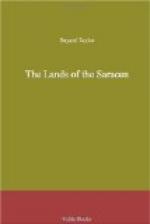Paradise Regained.
Jerusalem, Thursday, April 29, 1852.
Leaving the gate of Jaffa, we rode eastward between delightful gardens of fig, citron, orange, pomegranate and palm. The country for several miles around the city is a complete level—part of the great plain of Sharon—and the gray mass of building crowning the little promontory, is the only landmark seen above the green garden-land, on looking towards the sea. The road was lined with hedges of giant cactus, now in blossom, and shaded occasionally with broad-armed sycamores. The orange trees were in bloom, and at the same time laden down with ripe fruit. The oranges of Jaffa are the finest in Syria, and great numbers of them are sent to Beyrout and other ports further north. The dark foliage of the pomegranate fairly blazed with its heavy scarlet blossoms, and here and there a cluster of roses made good the Scriptural renown of those of Sharon. The road was filled with people, passing to and fro, and several families of Jaffa Jews were having a sort of pic-nic in the choice shady spots.
Ere long we came to a fountain, at a point where two roads met. It was a large square structure of limestone and marble, with a stone trough in front, and a delightful open chamber at the side. The space in front was shaded with immense sycamore trees, to which we tied our horses, and then took our seats in the window above the fountain, where the Greek brought us our breakfast. The water was cool and delicious, as were our Jaffa oranges. It was a charming spot, for as we sat we could look under the boughs of the great trees, and down between the gardens to Jaffa and the Mediterranean. After leaving the gardens, we came upon the great plain of Sharon, on which we could see the husbandmen at work far and near, ploughing and sowing their grain. In some instances, the two operations were made simultaneously, by having a sort of funnel attached to the plough-handle, running into a tube which entered the earth just behind the share. The man held the plough with one hand, while with the other he dropped the requisite quantity of seed through the tube into the furrow. The people are ploughing now for their summer crops, and the wheat and barley which they sowed last winter are already in full head. On other parts of the plain, there were large flocks of sheep and goats, with their attendant shepherds. So ran the rich landscape, broken only by belts of olive trees, to the far hills of Judea.
Riding on over the long, low swells, fragrant with wild thyme and camomile, we saw at last the tower of Ramleh, and down the valley, an hour’s ride to the north-east, the minaret of Ludd, the ancient Lydda. Still further, I could see the houses of the village of Sharon, embowered in olives. Ramleh is built along the crest and on the eastern slope of a low hill, and at a distance appears like a stately place, but this impression is immediately dissipated on entering it. West of the town is




